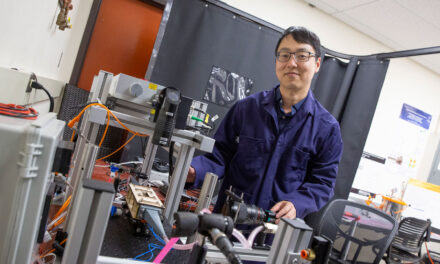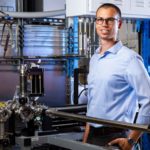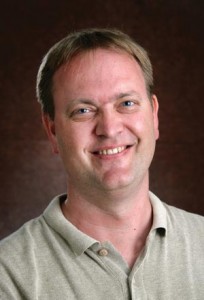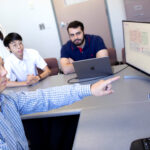
Our research: Education
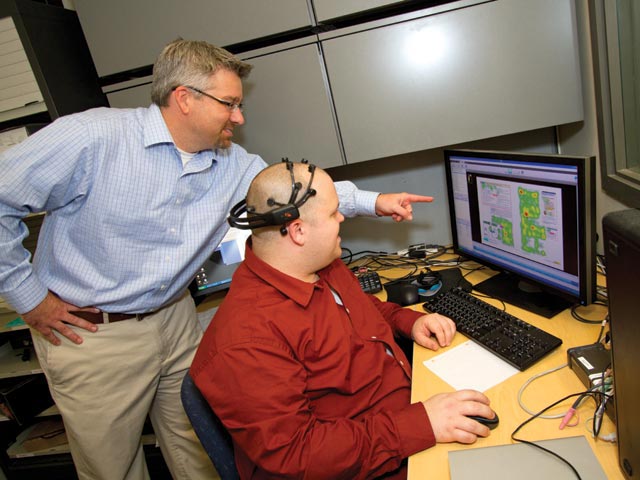
Society needs more engineers. We are engaged in advancing the ways we educate engineering students. Our research focuses on learning methods, cognitive theory and best teaching practices, as well as integration of engineering concepts in K-12 educational programs to engage students early and educate our community about the impact that engineering has on everyday life.
Professional development program brings engineering into middle school classrooms
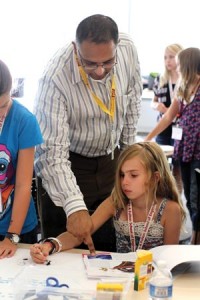 Tirupalavanam Ganesh, assistant professor, School for Engineering of Matter, Transport and Energy, and Monica Elser, education manager, Global Institute of Sustainability (GIOS), have teamed up to help bring engineering education to Valley-area middle schools.
Tirupalavanam Ganesh, assistant professor, School for Engineering of Matter, Transport and Energy, and Monica Elser, education manager, Global Institute of Sustainability (GIOS), have teamed up to help bring engineering education to Valley-area middle schools.
Their professional development workshop, “Urban Heat Island: Linking Science, Society and Technology,” attracted teachers from Isaac, Camp Verde, Kyrene, Mesa, Deer Valley and Chandler school districts.
Designed for teachers from a wide range of disciplines including social studies and language arts, the workshop shows them how to teach about an urban sustainability issue incorporating concepts from natural sciences, social sciences and engineering.
“We are developing a professional development model that doesn’t take teachers out of the classroom and also allows them the freedom to customize learning,” says Ganesh.
During the seminar, teachers are presented with three sets of lessons—all with the same theme of the interaction of man and the environment: What is the urban heat island? How does the urban heat island impact organisms and people? How can we mitigate the impact of the urban heat island?
The goal is to make science relevant for both teachers and students by encouraging them to connect with their urban setting.
Elser says, “We want teachers and their students to take a look around their neighborhoods and ask questions about how the changes we make impact them and the organisms that share our urban ecosystem. Can they make small changes that create a more livable city?”
The program also brings ASU research into the community. All of the lessons are based on core research initiatives from both Fulton Engineering and GIOS.
Tapping into the power of digital learning
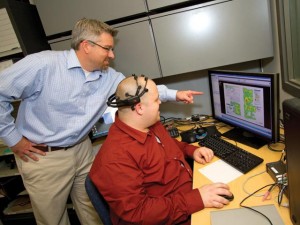 Through a grant from the Office of Naval Research, Robert Atkinson, associate professor in the School of Computing, Informatics, and Decision Systems Engineering is evaluating and improving digital learning tools.
Through a grant from the Office of Naval Research, Robert Atkinson, associate professor in the School of Computing, Informatics, and Decision Systems Engineering is evaluating and improving digital learning tools.
Atkinson and fellow researchers in the Learning Sciences Research Lab have partnered with Mountain Pointe High School and the Mesa School District to design and administer summer school programs using intelligent tutoring systems aimed at helping in remedial programs to improve math skills and scores. The results are helping the ONR implement learning systems for recruits to help them make the most of their careers.
Studies reveal that students learn more in less time, and retain more of what they learn using the intelligent tutoring system.
Atkinson says that another advantage of the intelligent tutoring system is that it offers individualized instruction to a classroom of students.
The researchers are working on improvements to the learning systems as well. While students are using the systems, EEG and skin-conductance technologies as well as pressure-sensitive chairs collect information about engagement, interest and frustration level. This information can be fed into the system so it can respond and build the right level of challenge for the learner.
Ultimately, the goal is to provide systems that can support both core reading and math skill development as well as damage control training for navy personnel in the field, while also providing engaging tools for teachers in the public school system.
The ONR produced a video on the project, which can be viewed on the LSRL website: lsrl.lab.asu.edu.
NSF CAREER Award for Herrmann
Marcus Herrmann’s CAREER proposal “A Numerical Laboratory for Immiscible Interface Dynamics” will be funded by the National Science Foundation. His CAREER proposal aims to develop a “numerical laboratory,” i.e., a complete, computational framework for modeling the interaction of immiscible fluid interfaces in complex geometries. One of the major impacts of his CAREER research will be to accomplish a goal that is today simply out of reach: prediction of the entire atomization process in a realistic, complex, next-generation gas turbine fuel injector under realistic operating conditions.
The education plan that Marcus proposed will target sixth graders in a Title I elementary school and be collaboratively developed in a way that will not only allow it to be sustained far beyond the period of CAREER support, but is also intended to be scaled out to schools across Arizona.
The Ph.D. student supported on the CAREER funds will also be part of the Engineering Education concentration in the mechanical/aerospace engineering Ph.D. programs.



